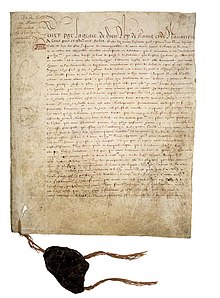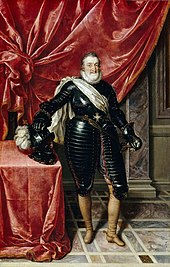Edict of Nantes
The Edict of Nantes (French: Édit de Nantes) of 1598 granted religious tolerance and full civil rights to the Calvinist Protestants (Huguenots) in Catholic France, but on the other hand fixed Catholicism as the state religion. It thus temporarily put an end to the age of religious wars between Huguenots, Catholics and the royalty (Huguenot Wars).
Henry IV (Henry of Navarre), who had himself converted from Protestantism to Catholicism after his accession to the throne, and who sought to pacify the country after his victory over the Catholic League that was fighting him, signed the edict in Nantes on April 13, 1598. It granted Calvinists freedom of conscience and the free exercise of religion in public, except in Paris and its environs and in cities with episcopal sees or royal castles.
Noble Huguenots were allowed non-public worship in their homes. Protestants were allowed to build churches (called temples), and their pastors were to be paid by the state and exempt from certain obligations. The edict also guaranteed Protestants full civil rights, such as the right to hold public office, and it established a separate chamber at the Parlement of Paris, the Chambre de l'Édit, to settle disagreements that might arise from differing interpretations of its provisions. Moreover, the Protestants were to be allowed to retain as places de sûreté for a further eight years those fortified towns which they had held in their power in August 1597 (about 100); the stationing costs of the garrisons were to be paid by the king.
The edict also confirmed Catholicism as the state religion and restored the possibility of practicing the Catholic religion wherever it had been suppressed during the previous wars. In effect, it made any further spread of Protestantism in France impossible. Nevertheless, the Pope (Clement VIII), the Catholic priesthood, and the Parlements in France resisted the edict; they sought to interpret it as restrictively as possible.
Cardinal Richelieu, for his part, considered the political provisions of the Edict a danger to the absolutist state and annulled them in part in the Peace of Alès in 1629.
On October 18, 1685, King Louis XIV revoked the Edict altogether in the Edict of Fontainebleau, Édit de Fontainebleau. This deprived French Protestants of all religious and civil rights. Within a few months, hundreds of thousands fled, mainly to the Calvinist territories of the Netherlands, the Calvinist cantons of Switzerland, and to Prussia (Edict of Potsdam).
The act of signing the Edict of Nantes is depicted on a relief on Geneva's Reformation Monument.
.jpg)
Signing of the Edict depicted on the Geneva Reformation Monument

The Edict of Nantes

Henri IV de France portrayed by Frans Pourbus le Jeune
Search within the encyclopedia